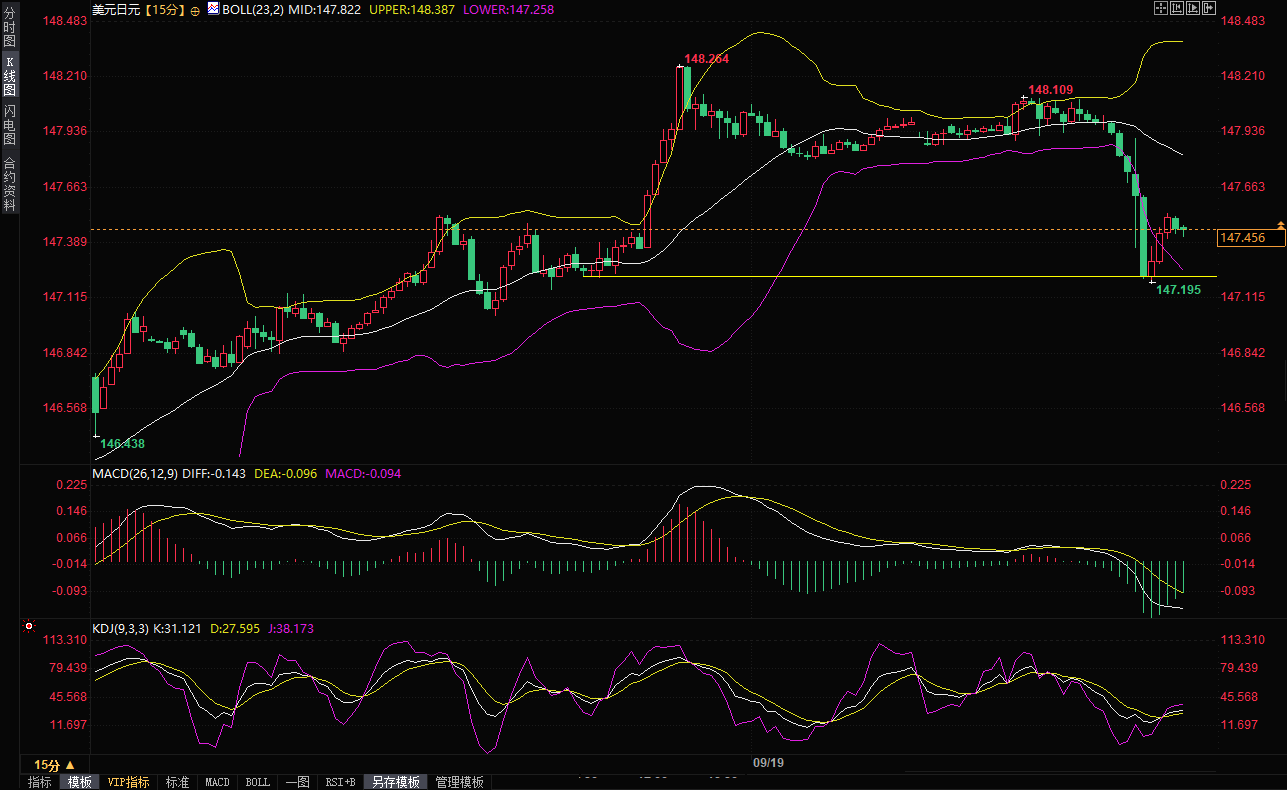The Bank of Japan's hawkish stance breaks out! ETFs are selling off despite rock-solid interest rates, sending the yen soaring and stocks wailing.
2025-09-19 13:22:08

The “storm of dissent” at the meeting: Why did the two committee members’ calls for an interest rate hike fall on deaf ears?
The Bank of Japan's decision-making process is known for its cautious approach, and this two-day policy meeting was no exception. A majority of the nine board members voted to maintain the short-term policy rate at 0.5%, in line with market consensus.
However, the meeting was not calm: two senior members, Naoki Tamura and Hajime Takada, boldly raised objections, advocating raising borrowing costs to 0.75% to more actively respond to inflationary pressures and economic recovery momentum.
Although the proposal ultimately failed to pass, it served as a rift, clearly exposing the rise of hawkish forces within the central bank. Tamura and Takada's dissenting votes signaled a subtle shift in the Bank of Japan's policymaking dynamics. Over the past year, the Bank of Japan has gradually moved away from a decade of zero interest rates, raising short-term interest rates to 0.5% in January and formally exiting its large-scale asset purchase program. Against this backdrop, the two committee members' unsuccessful calls for a rate hike cast a subtle tension over the entire meeting, seemingly foreshadowing an accelerating shift in the future path.
The Bank of Japan emphasized in its statement that the decision to sell ETFs and REITs was reached by unanimous vote and strictly adhered to the basic principle of "avoiding destabilizing effects on financial markets." This means that the sell-off will be carried out in a gradual and orderly manner and will not rashly impact market liquidity.
Looking back at history, the Bank of Japan has accumulated massive ETF and REIT holdings through quantitative easing policies since 2010. These assets were once regarded as an important part of the central bank's "firewall" to support stock market stability and economic confidence.
But now, as Japan's economy steadily approaches its 2% inflation target—the latest data shows that the core consumer price index (CPI) rose 2.7% year-on-year in August, well above the central bank's target—these "stimulus tools" have become obsolete. The pace of sales also reflects the central bank's balancing act: while the annual 330 billion yen reduction in ETF holdings is significant, it falls far short of the market's worst-case scenario of a massive dumping. The 5 billion yen annual sales pace of REITs is more restrained, aiming to minimize disruption to the real estate market. In recent statements, Governor Kazuo Ueda has repeatedly emphasized the central bank's unwavering resolve to continue raising interest rates, while also vowing to remain vigilant to external uncertainties, particularly the impact of potential US tariffs on Japan's export economy. This statement represents not only a response to internal dissent but also a strategic buffer against global trade frictions.
The market "roller coaster" is staged in an instant: the yen rebounds strongly, why are Japanese stocks the only ones left empty?
The market reaction to the decision was textbook dramatic. On Friday morning, the Nikkei 225 index quickly fell from its recent record high, dropping as much as 1.9% (the decline has since narrowed to 0.5%), as investors dumped stocks and flocked to safe-haven assets. Conversely, the yen surged against the dollar, reaching key support at 149.20, pushing short-term Treasury yields higher.

(USD/JPY 15-minute chart, source: Yihuitong)
This wave of "currency appreciation and stock market pressure" is directly due to the signal effect of the central bank's sale of risky assets - the reduction of ETFs and REITs is interpreted as a further weakening of asset purchase support, which means that the liquidity "honey" will gradually tighten .
Meanwhile, the hawkish dissenters of two committee members added fuel to the fire, intensifying market concerns about "accelerated normalization." Saxo Bank's Chief Investment Strategist, Charu Chanana, pointedly noted, "The dissenting opinions of Naoki Tamura and Hajime Takada highlight the growing hawkish pressure within the Bank of Japan. While the majority of committee members still favor a conservative approach, these two dissenting votes signal a shift in the discussion toward accelerated normalization. This isn't just a posturing; it represents a gradual shift in the committee's dynamics, potentially providing lasting support for the yen."
From a broader perspective, after the Bank of Japan completely ended the era of negative interest rates at the end of last year, global investors have become accustomed to its "gradual" approach. However, the early arrival of this ETF sale still caught the market off guard.
A recent Reuters survey shows that over half of economists expect the Bank of Japan to raise its benchmark interest rate by at least 25 basis points in the October-December quarter, but there is significant disagreement on the timing of the hike, with the focus primarily on October and January. This stands in stark contrast to the Federal Reserve's dovish rate cut on Wednesday. While the Fed was signaling easing measures to stabilize the sluggish job market, the Bank of Japan's hawkish stance at this time has undoubtedly heightened expectations of a narrowing interest rate gap between Japan and the United States, further increasing pressure on the yen to appreciate.
Hirofumi Suzuki, chief currency strategist at Sumitomo Mitsui Banking Corporation in Tokyo, said bluntly: "This is surprising. The start of ETF sales, coupled with the two votes against keeping policy unchanged, has an overall hawkish bias. Even with events such as the LDP leadership election on October 4, the Bank of Japan has stated that it will steadily advance normalization. Another rate hike is expected in October, which is expected to put appreciation pressure on the yen against the dollar, that is, push USD/JPY lower."
Analysts debate: Hawkish signals are good for banks, but structural concerns in the stock market are hard to dispel?
Analysts on Wall Street and in Tokyo interpreted the decision like a high-level debate, with diverse opinions but also a common understanding. Ben Benett, head of Asian investment strategy at L&G Asset Management in Hong Kong, emphasized: "While interest rates remained stable, the asset sales announcement and the two votes in favor of a rate hike give the meeting an overall hawkish tone, especially considering this week's Fed rate cut. This could strengthen the yen." He believes this combination will further narrow the interest rate gap between Japan and the United States, benefiting yen assets but putting pressure on export-oriented companies.
Sompo Institute Plus Senior Economist Rito Koike offered a more pragmatic analysis: "The vote of dissent and the decision to sell ETFs were quite surprising. However, given the limited size of ETF and J-REIT holdings, I do not believe this move will have a significant impact on stock prices in the medium to long term. Establishing a clear path for handling ETFs is a key turning point. The Bank of Japan is exploring the possibility of raising interest rates before the end of the year, and this possibility exists. However, given future inflation trends and the political uncertainty that would arise if Sanae Takaichi were elected as the leader of the ruling party, the chances of a rate hike are limited. Therefore, the Bank of Japan is, to a certain extent, using these signals to signal its stance on rate hikes. However, data measuring the impact of Trump's tariffs will take time to emerge, and these conflicting factors will pose challenges going forward."
Charu Chanana added that this is a structural headwind for Japanese stocks, although the impact depends on the pace of selling and the strength of the signal. However, for the banking sector, the normalization process could be positive through a steeper yield curve and better net interest margins (NIM), provided economic momentum remains stable.
Hirofumi Suzuki's view is more forward-looking: "From the perspective of the schedule, the Bank of Japan has locked in a steady track. Even if external events occur frequently, expectations of interest rate hikes will still dominate the market narrative." These comments are intertwined into a network, outlining the multi-dimensional impact of the Bank of Japan's decision: in the short term, the appreciation of the yen may become the protagonist, and the stock market will be under pressure but will not collapse; in the medium and long term, hawkish pressure will promote policy normalization, but "black swans" such as external tariffs and geopolitical risks remain hidden concerns.
Looking back at the entire incident, the Bank of Japan's move was both a product of internal consensus and a response to external factors. Against the backdrop of the Federal Reserve's easing shift, Japan's hawkish stance not only stabilized domestic inflation expectations and injected new vitality into the yen, but it also raised concerns among stock market investors. Kazuo Ueda's press conference will be the next climax of this monetary drama—can he address dissenting voices and clarify the blueprint for rate hikes? Global markets are waiting with bated breath. With August's CPI figures continuing to exceed targets, Japan's economic recovery is gaining momentum, but the challenge remains: how to strike a balance between normalization and stability? This decision may be just the prelude to greater change, and it warrants close attention from every investor.
At 13:19 Beijing time, the USD/JPY exchange rate was 147.45/46.
- Risk Warning and Disclaimer
- The market involves risk, and trading may not be suitable for all investors. This article is for reference only and does not constitute personal investment advice, nor does it take into account certain users’ specific investment objectives, financial situation, or other needs. Any investment decisions made based on this information are at your own risk.





















